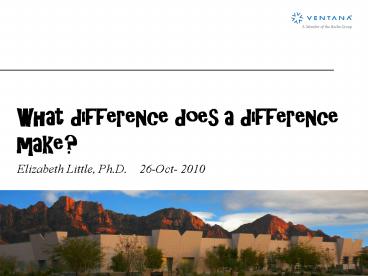What difference does a difference make? - PowerPoint PPT Presentation
Title:
What difference does a difference make?
Description:
... in section thickness in the histology laboratory Fixative Duration of fixation Tissue processing Paraffin Tissue block Microtome Histologist Objective ... – PowerPoint PPT presentation
Number of Views:77
Avg rating:3.0/5.0
Title: What difference does a difference make?
1
What difference does a difference make?
- Elizabeth Little, Ph.D. 26-Oct- 2010
2
Talk overview
- Introduction
- Tissue thickness variation
- Using best histological practices
- Stain intensity variation due to tissue thickness
- The difference matters
- Could impact algorithm functionality
3
Systems integration
source www.vagabondish.com
4
The Hematoxylin Eosin (HE) slide
- Numbers
- In 2009, 330 million histology slides were
produced in the United States - 83 (274 million) were stained with HE
- Pathologist
- Potential first look at the disease state
- Cost
- Dollars vs. thousands of dollars for more
advanced testing
5
Impacts of HE stain variability
- Pathologist workflow is impacted by staining
variability - Repeat slides
- Imaging workflow is also impacted by staining
variability - Algorithms can by impacted by stain variability
6
Antecedents that are helpful for HE slide image
analysis
- Control of the stain variation
- Under best practices we can control stain
variability to a certain degree - Algorithms that are robust against stain variation
7
Staining variables we cannot control- tissue
type affects stain intensity
8
Pixel count (N)
Intensity Level
9
Staining variables that we have some control over
- tissue thickness impacts stain intensity
2 micron
4 micron
10
Pixel count (N)
11
Talk overview
- Introduction
- Tissue thickness variation
- Using best histological practices
- Stain intensity variation due to tissue thickness
- The difference matters
- Could impact algorithm functionality
12
Possible sources of variations in section
thickness in the histology laboratory
- Fixative
- Duration of fixation
- Tissue processing
- Paraffin
- Tissue block
- Microtome
- Histologist
13
Objective measure the sectioning process impact
on tissue thickness
- 1 tissue block used
- 1 microtome
- 2 settings
- Automated (32 slides per histologist)
- Manual (32 slides per histologist)
- 2 histologists
- 22 years of experience vs. 4 years of experience
14
Tissue thickness variability testing outline
- Section
- Tissue was sectioned using a microtome setting of
4 microns - Measure Section Thickness
- Interferometry
- Stain
- HE
- Measure intensity
- Whole slide imaging
15
Measuring tissue thickness using vertical
scanning interferometry
source cnx.org
16
Tissue thickness using interferometric
measurements
- Glass vs. paraffin
- Tissue was not measured
- Interferometer limitation
- Glass level variability
- Measurements taken at 6 locations repeatedly
17
How well are we using the interferometer?
Source Standard deviation Contribution
Total measurement (gage) 0.29 0.80
Repeatability equipment variation 0.29 0.79
Reproducibility operator variation 0.03 0.01
Slide variation 3.20 99.20
Total variation 3.21 100.00
18
How good is our tissue thickness measuring
system? - gage R R
Equipment variation 0.79
Operator variation 0.01
Sample variation 99.20
19
Slice thickness variation by histologist
Histologist Number of slides Measured thickness average S.D. (mm)
Combined 128 4.74 0.16
1 64 4.65 0.10
2 64 4.84 0.16
- Nominal setting was 4 microns
- Both Histologists cut significantly thicker than
4 microns - Both Histologists cut at significantly different
thicknesses from each other
20
Manual vs. automated microtomy impact on tissue
thickness
Histologist Microtome setting Measured thickness S.D. (mm)
1 Automated 4.65 0.13
1 Manual 4.65 0.08
2 Automated 4.91 0.16
2 Manual 4.76 0.12
- Histologist 1 mean thickness was not impacted by
microtome setting - Both histologists had statistically significant
more variability using the - automated setting as compared to the manual
setting
21
Block influences tissue thickness
Tissue block Measured thickness average S.D. (um)
Tissue one (n32) 4.65 0.13
Tissue two (n16) 4.60 0.12
Tissue three (n16) 4.36 0.12
- Histologist 1 was the cutter
- Automated setting used
- Tissue 3 was cut significantly thinner than
tissues 1 2
22
Summary of tissue thickness measurement results
- Histology (location within block, slice
selection, soaking, etc.) - Difference in mean tissue thickness
- Microtome setting automated vs. manual
- Both histologists were impacted by setting
- Block
- Blocks 1 and 2 were cut more thickly than block 3
23
Talk overview
- Introduction
- Tissue thickness variation
- Using best histological practices
- Stain intensity variation due to tissue thickness
- The difference matters
- Could impact algorithm functionality
24
Stain intensity variation due to tissue thickness
- normal breast lymph node study
3 micron
4 micron
25
Objective measure tissue thickness impacton
stain intensity
- Tissue was sectioned and measured for thickness
- All slides were stained using the same method
- All slides were scanned using whole slide imaging
and their average intensities were measured
26
Lymph node 1 micron makes a measurable
difference
27
Talk overview
- Introduction
- Tissue thickness variation
- Using best histological practices
- Stain intensity variation due to tissue thickness
- The difference matters
- Could impact algorithm functionality
28
Grey scale intensity differences
Pixel count (N)
29
Summary
- Expected vs. measured is different
- The difference is quantifiable
- Tissue thickness
- Stain intensity
- The difference matters
- Could impact algorithm functionality
- Tissue thickness and stain intensity correlate as
expected
30
Further studies
- Intensity vs. tissue type
- Microtome bounce
- Histology vs.
- Drift
- Knife
- Location in block
- Degrees of fixation
31
Acknowledgments
Cindy Connolly Wendy Lange Allison
Cicchini Heather Free Aaron Ewoniuk
Jonathan Hall Mike Cohen, Ph.D. David
Clark, Ph.D.
32
(No Transcript)

